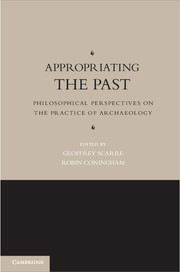Book contents
- Frontmatter
- Contents
- Contributors
- Editors
- Chapter 1 Introduction
- Part One Claiming the Past
- Chapter 2 The Values of the Past
- Chapter 3 Whose Past? Archaeological Knowledge, Community Knowledge, and the Embracing of Conflict
- Chapter 4 The Past People Want
- Chapter 5 The Ethics of Repatriation
- Chapter 6 On Archaeological Ethics and Letting Go
- Chapter 7 Hintang and the Dilemma of Benevolence
- Part Two Problems of Meaning and Method
- Part Three Problems of Ownership and Control
- References
- Index
Chapter 3 - Whose Past? Archaeological Knowledge, Community Knowledge, and the Embracing of Conflict
Published online by Cambridge University Press: 05 December 2012
- Frontmatter
- Contents
- Contributors
- Editors
- Chapter 1 Introduction
- Part One Claiming the Past
- Chapter 2 The Values of the Past
- Chapter 3 Whose Past? Archaeological Knowledge, Community Knowledge, and the Embracing of Conflict
- Chapter 4 The Past People Want
- Chapter 5 The Ethics of Repatriation
- Chapter 6 On Archaeological Ethics and Letting Go
- Chapter 7 Hintang and the Dilemma of Benevolence
- Part Two Problems of Meaning and Method
- Part Three Problems of Ownership and Control
- References
- Index
Summary
INTRODUCTION
Tackling the overall theme of ‘appropriating the past’ immediately raises two issues: the first is who is doing the appropriating, on what basis, and within what worldview; who is included in that appropriation and who is excluded; and what are the mechanisms and decision-making criteria and, in Foucault's terms, the disciplinary technologies or mechanisms that create and perpetuate that inclusion and exclusion (e.g., Foucault 1995 [1977]: 195–228; see also Hooper-Greenhill 1992: 190)? The second issue is, what do we mean by ‘the past’ – is it something that is finished and complete in a linear framework of time, something that really is ‘past’ and therefore can only be ‘interpreted’ and ‘known’ objectively, or is it something within which connections can still be experienced, within a non-linear or circular conception of time, and in that sense actually still subjectively ‘present’? Clearly all these issues are concerned with authority: who has it, why do they have it, how do they have it, and how does it play out when those who are excluded challenge that authority? This is now a key strand in much heritage research: the tensions between ‘authorised’–‘hegemonic’ and ‘alternative’–‘subaltern’ forms of heritage discourse, between universal and particularist claims to heritage, or between ‘expert’ and ‘lay’ knowledge (e.g., Smith 2006, Robertson 2012).
- Type
- Chapter
- Information
- Appropriating the PastPhilosophical Perspectives on the Practice of Archaeology, pp. 42 - 62Publisher: Cambridge University PressPrint publication year: 2012
- 1
- Cited by



